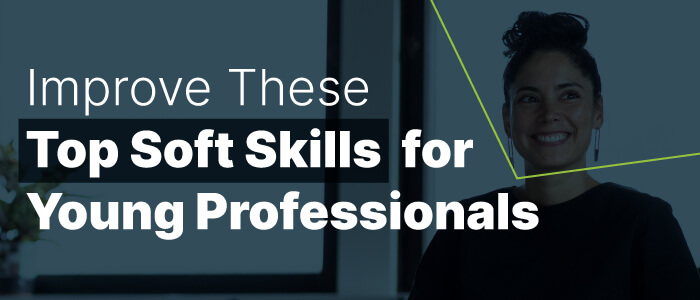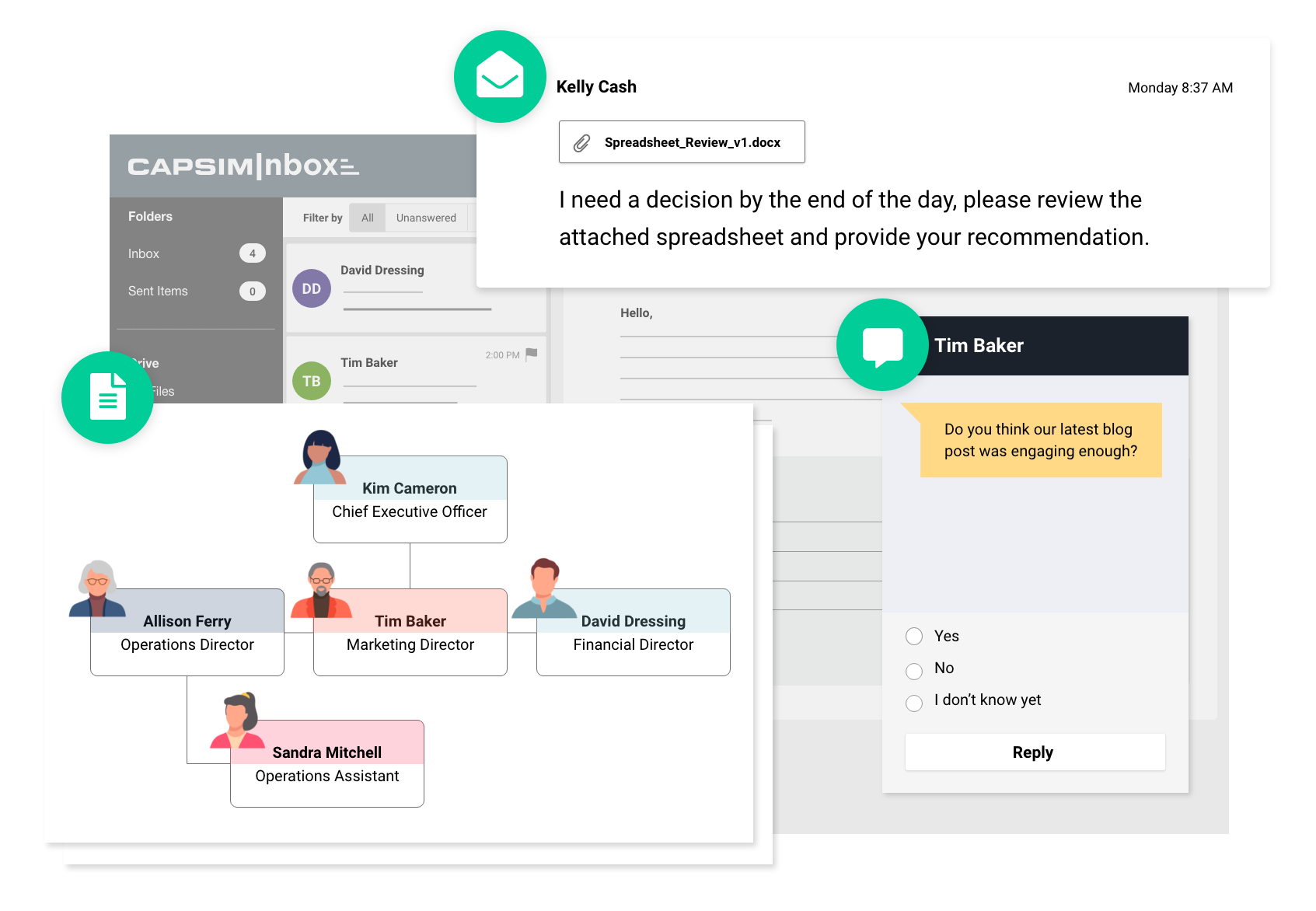Improve these 5 Soft Skills for Young Professionals in Your Company ASAP

July 12, 2022

We all know the stereotypes about young professionals.
“They lack work ethic.”
“They only think about themselves.”
“They care more about their phones and social media than working hard.”
However, young professionals (which we’re defining as age 30 and under) are also crucial to your company's success. You can have excellent management and leaders, but you also need reliable people executing the work and driving results.
This requires a workforce with strong soft skills, including your young professionals.
In this post, we’ll discuss why soft skills are crucial for young professionals and which soft skills employers want and are most important to their success.
We’ll also examine traditional approaches to soft skill development and their flaws and showcase why inbox simulations are a useful tool for this particular use case.
Improving Soft Skills for Young Professionals at Your Company
In any robust succession plan, a strong option is hiring from within. There are young professionals on your team that have the potential to one day lead your company.
Aside from leadership roles, young professionals in your workforce drive your company forward because they’re often the ones closest to the work and to clients. They’re also looking for growth opportunities that align with their lifestyle expectations.
It’s a real culture shift, transitioning from college to the professional world. According to the Havard Business Review, many college graduates feel disoriented, confused, and overwhelmed with the real world.
They struggle with the lack of clear and consistent feedback that they’re used to. They find it challenging to build relationships with new people from various backgrounds and feel overwhelmed with the responsibility and accountability of working in a team.
You might think these are all everyday things you had to navigate too, but the professional world today is different. It’s faster, tech-driven, and highly competitive. There’s more pressure to wear many hats, be innovative, and take ownership of tasks and projects.
To make things easier for young professionals to assimilate to the working environment and get the most from them, it’s crucial to invest in their learning and development.
Investing in young employees also makes them more likely to stay. The 2019 Deloitte Millennial Survey (which now surveys both Millennial and Gen Z employees) found that “49 percent would, if they had a choice, quit their current jobs in the next two years.” A quarter of those reported that they had left a previous employer within the past two years.
For the good of your young professionals and your company, let’s dig deeper into what soft skills they may need help with.
What Soft Skills do Young Professionals Need?
You need to know where you should invest in training your young employees. Soft skills are pivotal in their success. In How to Develop Soft Skills in Your Employees, we highlight the importance of soft skills, including that 85 percent of job success comes from excellent soft and people skills.
Despite soft skills being crucial, companies struggle to assess soft skills without a formal process, and only 41 percent even have a formal process.
We’ll get to a solution for the “how” in a moment. But first, what are the soft skills that young professionals need to make a positive impact in their jobs?
1. Collaboration
Otherwise defined as teamwork, young professionals need to be able to:
- Work well with other people from diverse backgrounds and worldviews
- Contribute to group discussions and bring ideas forward
- Develop a cooperative spirit
Collaboration is a cornerstone of long-term success. Without it, teams are less effective, and company targets aren’t met.
An example of collaboration is the whole team meeting to brainstorm new ideas virtually or in person. Employees must learn to let others share their thoughts without prejudice for effective brainstorming sessions and develop a listen-first, talk-second mindset.
2. Persuasion
Persuasion is the ability to influence others and can be used to drive projects forward. The ability to influence people, present compelling arguments through clear and concise communication, and prompt others to act can hugely benefit the workplace.
An employee with solid persuasion skills also uses and hones other soft skills like emotional intelligence, active listening, and negotiation.
Imagine trying to persuade someone who already feels unheard or uncomfortable. You’ll have a tough time. Using active listening, let the other person share their concerns and arguments so they feel valued and start building trust. You’ll have an easier time persuading them if you understand their motivations.
3. Creativity
Creativity is another soft skill that relies on other soft skills. It pulls together curiosity and problem-solving to come up with innovative solutions. It also helps develop other characteristics like perseverance, openness, and courage.
Creativity is teachable and measurable. With the right tools to assess creativity, you can determine which employees demonstrate a creative mindset and develop creativity in others to level up your team.
You might give your most creative employee the task of developing novel solutions for a problem that crops up regularly in your company. They can examine the issue, consider the solutions, and maybe even bring two solutions together. This break with convention fosters a creative mindset, and the employee feels valued.
4. Adaptability
Being adaptable is a soft skill that companies love. Adapting to changing environments and work processes makes employees resilient and trustworthy team players. They’re open and willing to learn new things, take on challenges, and adjust to suit team dynamics.
Adaptability is highly measurable with workplace simulations that focus on responding quickly to changing ideas, taking on responsibilities, and pivoting to new strategies when necessary.
Employees need strong adaptability skills when working as a team, attempting to solve problems, and even on sales calls. For example, a potential customer might switch from being ready to move forward to backing off; how will your employee react and pivot?
5. Time Management
In a modern environment, our attention is drawn in many different directions, from social media to messaging, phone calls, and YouTube videos. Effective time management includes the ability to put aside distractions, and knowing how to prioritize tasks, meet deadlines, and set goals.
With excellent time management, employees finish projects on time. They’re more productive and more successful. Once again, other soft skills play a role in time management. Organization skills, goal-setting, communication, adaptability, and stress management are all factors.
An example of excellent time management could be auditing how time is spent. Encourage employees to observe where their attention goes, whether they’re focused on the task at hand, how easily distracted they are, and whether they have everything needed to succeed.
Why is it Crucial for Your Young Employees to Develop their Soft Skills?
Some people are naturally gifted with empathy, emotional intelligence, time management, and other soft skills. In others, soft skills need to be developed.
In a more digitalized world, young employees have fewer opportunities to develop and practice soft skills. Some companies are fully remote, meaning the only communication team members have is over messaging apps or Zoom calls.
Other companies don’t place enough emphasis on open and regular communication. Automation leads to less communication and cutting out the middle man.
Whatever the case, younger generations need more soft skills training than in previous years. Environments evolve, cultures change, and the workplace is a different ballpark.
Hard skills are still essential, but soft skills help employees perform, grow, and make an impact while gaining experience and leveling up their technical skills. Unfortunately, a lack of soft skills usually shows up after hiring.
Related: Soft Skills vs. Hard Skills
Considering most hiring and firing decisions come down to soft skills, there’s an opportunity to invest in soft skills for the good of your employees and your company.
A team that regularly practices and improves soft skills will be more productive, able to listen and contribute, more satisfied and invested in their roles, and makes for a great team dynamic.
Traditional Approaches to Soft Skill Development Fall Short
Traditional methods of soft skills development include presentations, behavioral interviews, role-playing, and self-assessments. None of those approaches promote meaningful development.
Presentations are often dull and don’t engage employees. Interviews and self-assessments don’t promote honesty and openness. There’s hardly ever immediate and actionable feedback.
Overall, they lack “learning by doing.”
It’s one thing to be knowledgeable, but applying it in a high-pressured environment is a different kettle of fish. Instructional tools that ignore the knowing-doing gap do nothing to prepare employees for the workplace.
Traditional methods fail to foster self-awareness; without it, employees will struggle to recognize their traits and attributes.
Since engaging your team affects productivity, innovation, and succession planning, developing soft skills in relevant, immersive, and engaging ways is essential.
Stop ticking boxes. Start helping young employees learn by doing and practicing.
Inbox Simulations Provide Real-World Practice for Soft Skill Development
There’s a new way of doing things. You can make learning tangible and engaging through inbox simulations.
Learning by doing is central to the simulation approach. You can put employees into a simulated role with “coworkers” and get them to interact. They’ll learn to actively listen and make decisions based on real-life scenarios.
Best of all, employees benefit from hands-on learning in a safe, risk-free environment. Instead of making mistakes in the real world, mistakes made in a simulation are opportunities for learning and growth.
Self-awareness starts with a self-assessment, but it doesn’t end there. People often don’t flag their skills gaps or don’t realize they lack in certain areas. Inbox simulations verify soft skill competency through the simulations to show employees their ACTUAL skill levels and gaps.
Inbox simulations are immersive and engaging. You can build custom simulations based on specific roles and develop game-like structures, storylines & characters to bring simulations to life.
What do you think is more engaging?
- A presentation using a whiteboard, or
- A 10-minute simulation where every employee gets the chance to devise a solution without fear of judgment? Add immediate and actionable feedback, and you’re on to a winner.
Your employees will know where their skill gaps are based on performance data when feedback is immediate and actionable. When learning is fresh in the mind, feedback, analysis, and debriefing create a connection between mentor and mentee.
Inbox Simulations are a Useful Tool to Develop Soft Skills for Young Professionals
You’re setting your company up for success by fostering meaningful learning and continuous development. Young employees play a critical role in the growth of your organization, and the best way for them to develop soft skills is through practical application, engaging and relevant simulations, and effective feedback.
CapsimInbox bridges the gap between knowing and doing. With immersive, real-world scenarios, learners work through problems and situations they’ll remember and can improve upon next time.
With CapsimInbox, it’s easy to create custom inbox simulations, assessments, and skills gap analyses and tie it all together with robust reporting.
But you don’t have to take our word for it. Try our Self-Guided Demo if you have five minutes to test-drive an inbox simulation all by yourself.





.png?width=80&name=1-questions%20(1).png)